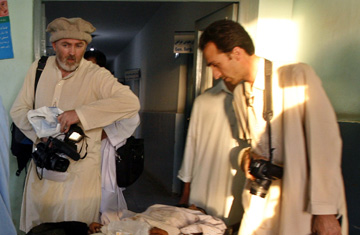
Stephen Farrell, left, a New York Times reporter, and Afghan translator Sultan Munadi interview a wounded Afghan man in a hospital in Kunduz on Sept. 4, 2009
A British commando raid on a Taliban hideout rescued kidnapped New York Times reporter Stephen Farrell on Sept. 9. But Farrell's Afghan translator Sultan Munadi and a woman and child were killed in the raid, raising questions about whether military force should have been used.
Farrell and Munadi were captured by Taliban gunmen on Sept. 5 while reporting on the aftermath of a NATO air strike on two hijacked fuel tankers. The strike killed more than 90 Afghans and stoked outrage about the frequent deaths of Afghan civilians in coalition air attacks. Soon after the pair were grabbed, their newspaper opened up channels to Taliban commanders in Kunduz, the province in northern Afghanistan where the hostage-taking occurred. Officials from the International Committee for the Red Cross were in direct contact with the captors, according to a source familiar with the negotiations, as were sympathetic local Afghans and tribal elders with ties to the Taliban.
Negotiators were "optimistic" that Farrell and Munadi would be freed within days, without payment of a ransom. Hostage-taking is a long-standing Afghan practice and almost always ends with captives being freed in exchange for money after days or weeks of haggling. But in this case, sources tell TIME, the senior Taliban commanders of Kunduz were "acting reasonably" and seemed willing to hand the reporter and his aide over without a payoff.
Hours before the British raid, Munadi was allowed to place a cell-phone call to his worried parents to reassure them that he and Farrell would soon be released. When the British commandos made their surprise attack on the house where the pair were being held, the two men rushed out. Munadi died in the firefight, shouting, "Journalist! Journalist!" Farrell recounted to his Times colleagues in Kabul. "He was lying in the same position as he fell," Farrell said. "That's all I know. I saw him go down in front of me. He did not move. He's dead. He was so close, he was just two feet in front of me when he dropped."
It is unclear whether Munadi was shot by his British rescuers or by the Taliban. Locals tell TIME that a woman and child in the house were killed along with a Taliban commander named Baz.
The Times' Kabul bureau had asked the British embassy there — Farrell holds Irish and British passports — to use a military rescue mission only as a last resort, since negotiations were under way to free the two reporters and any rescue attempt would imperil them. But according to the source close to the negotiations, a decision was made "at ministerial levels" in London to mount the operation. Neither the Times nor Farrell's family were warned of the impending raid. The British are partners of the U.S.-led military coalition in Afghanistan and have 8,000 troops in the country.
The British SAS team, which had one commando killed during the firefight, according to NATO officials in Kabul, flew off in a helicopter with Farrell but left Munadi's body behind. The translator's grieving relatives made the dangerous journey from Kabul to Kunduz to pick up the body. Munadi had returned briefly to Kabul during a break from graduate school in Germany and was working part-time for the Times, accompanying journalists on their increasingly dangerous forays out of the capital.
The Times' Kabul bureau is still recovering from an earlier kidnapping of correspondent David Rohde, which dragged on for seven months before he and his translator were able to escape.
With Rohde's kidnapping, as with Farrell's, the Times and other media organizations maintained a news blackout, said Bill Keller, the Times' executive editor, for fear that coverage of their plight would "raise the temperature and increase the risk to the captives." Quoted in his newspaper, Keller went on to add, "We're overjoyed that Steve is free, but deeply saddened that his freedom came at such a cost. We are doing all we can to learn the details of what happened. Our hearts go out to Sultan's family."
— With reporting by Shah Mahmoud Barakzai / Kabul
